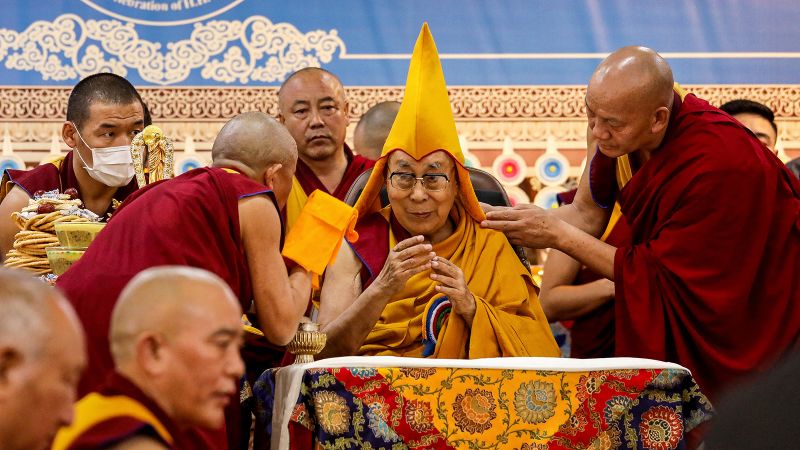
The Dalai Lama has pledged that his spiritual leadership will persist beyond his lifetime, affirming that a successor will be appointed to continue the centuries-old tradition of Tibetan Buddhism. This announcement, made in a video message on Wednesday to religious leaders in Dharamsala, India, underscores the ongoing conflict with China’s Communist Party over the future of Tibet.
The spiritual leader, who has resided in Dharamsala since fleeing a failed uprising against Chinese rule in 1959, stated, “I am affirming that the institution of the Dalai Lama will continue.” He emphasized that the Gaden Phodrang Trust, the official office of the Dalai Lama, holds sole authority over the recognition of his future reincarnation, a process that should adhere to historical traditions.
Historical Context and Current Implications
This declaration arrives just days before the Dalai Lama’s 90th birthday, setting the stage for a significant confrontation between Tibetan exiles and the Chinese government. The Dalai Lama has previously mentioned that he would re-evaluate the continuation of his role around this age, consulting with high lamas and the Tibetan public.
China’s Communist Party, which identifies as atheist, maintains that it alone has the right to approve the next Dalai Lama, a claim that has been a point of contention for decades. The Dalai Lama’s recent memoir, published in March, asserts that his successor will be born outside of China, in the “free world,” urging followers to disregard any candidate endorsed by Beijing.
The Battle for Succession
The potential for two rival Dalai Lamas—one chosen by the Tibetan Buddhist community and another by the Chinese government—looms large. This scenario could deepen the divide between Tibetans and the Chinese state, which has historically sought to control religious and cultural institutions within its borders.
According to Dr. Robert Barnett, a scholar of Tibetan studies, “The Chinese government sees control over the Dalai Lama’s succession as critical to their broader strategy of integrating Tibet into China. Any move by the Dalai Lama to appoint a successor outside of their influence is seen as a direct challenge.”
The Role of the Gaden Phodrang Trust
The Gaden Phodrang Trust, established to oversee the Dalai Lama’s affairs, will play a crucial role in the succession process. This body is tasked with ensuring that the search and recognition of the next Dalai Lama follow traditional practices, free from external interference.
Experts suggest that this move could reinforce the legitimacy of the Dalai Lama’s spiritual lineage among Tibetans and the global Buddhist community, potentially complicating China’s efforts to assert control over the process.
Looking Forward: The Future of Tibetan Buddhism
The Dalai Lama’s announcement not only addresses the immediate question of succession but also speaks to the broader issue of Tibetan autonomy and cultural preservation. As Tibetans in exile and their supporters worldwide continue to advocate for their rights, the Dalai Lama’s decision serves as a rallying point for their cause.
Meanwhile, the international community watches closely, aware that the outcome of this succession could have significant geopolitical implications. The United States and other Western nations have occasionally expressed support for Tibetan autonomy, though diplomatic relations with China often complicate these stances.
“The Dalai Lama’s decision is not just about spiritual leadership; it’s about the survival of Tibetan identity,” says Lobsang Sangay, former President of the Tibetan government-in-exile. “His Holiness’s actions ensure that our culture and religion will endure, despite external pressures.”
As the Dalai Lama approaches his 90th birthday, his commitment to ensuring the continuity of Tibetan Buddhism underscores the enduring struggle for cultural and religious freedom in the face of political adversity. The coming years will likely see intensified efforts by both Tibetan leaders and the Chinese government to shape the future of this pivotal religious institution.





